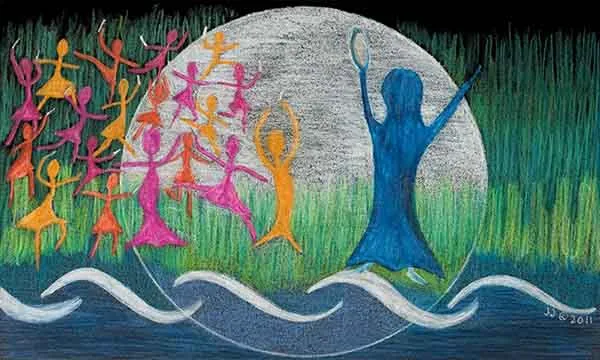Miriam's Cup

Like most religions, Judaism developed within a patriarchal society. Men recorded and interpreted religious law and wrote the traditional prayers. Miriam's Cup is a newer ritual object that is placed on the Seder table beside the Cup of Elijah to represent her importance -- and the importance of many women -- in the Passover story. Miriam's Cup is filled with water, rather than wine, and serves as a symbol of Miriam's Well, which was the source of water for the Israelites in the desert for 40 years. To emphasize this, everyone at the Seder table should fill Miriam's cup with a little water from your own water glass.
Filling Miriam's Cup is also a way of drawing attention to the importance of the other women of the Exodus story who have sometimes been overlooked but about whom Jewish tradition says, "If it wasn't for the righteousness of women of that generation we would not have been redeemed from Egypt." (Babylonian Talmud, Sotah 9b) In Exodus, there are five brave women: Yocheved, Moses’ mother, who chooses to let her son, Moses, live; and Shifra and Puah, the Hebrew midwives who defy the Pharaoh's order to kill the first born sons of the Jews. Then there is Miriam, Moses’ sister, who ensures her brother will live and about whom the following story is told:
Miriam prophesied, “my mother is destined to bear a son who will save Israel.” When Moses was born the whole house filled with light. Miriam’s father arose and kissed her on the head, saying, “My daughter, your prophecy has been fulfilled.” But when they threw Moses into the river, her father tapped her on the head saying, “Daughter, where is your prophecy?” So it is written, “And Miriam stood afar off to know what would become of the latter part of her prophecy.”
Finally, there is Pharaoh’s daughter, Batya, who defies her own father and plucks baby Moses out of the Nile. When Batya’s handmaidens saw that she intended to rescue Moses, they attempted to dissuade her, but Batya ignored them and did what she knew was right. As a result, she allowed the Jewish people to be saved.
These women were women of action, prepared to defy authority to make their visions a reality. Retelling the heroic stories of Yocheved, Shifra, Puah, Miriam and Batya reminds all of us—women and men—that with vision and the courage to act, we can carry forward the tradition those intrepid women launched.
Like Miriam and the other women of Exodus, women in all generations and all cultures have been essential for the continuity of our people. Let us drink from our water glasses to celebrate them, and draw from the strength and wisdom of our heritage.
[Leader: Fill Miriam's cup with water. When filled, everyone raises their water glass.]
Leader: Yehi ratzon milfanecha, adonai eloheinu, velohei avoteinu v'imoteinu, borei ha'olam: shetishm'reinu ut'kaymeinu bamidbar chayeinu im mayim chayim. V'titen lanu et hachizzuk v'et hachomchah l'daat she'tzmichat geulateinu nimtza baderekh chayim lo rak b'sof haderekh.
"Blessed is the force that sustains us with living water. May we, like the children of Israel leaving Egypt, be guarded and nurtured and kept alive in the wilderness, and may we receive the wisdom to understand that the journey itself holds the promise of redemption."
[Everyone: Take a sip of water from your water glass!]
Inspired to create
your own Haggadah?
Make your own Haggadah and share with other Seder lovers around the world
Have an idea
for a clip?
People like you bring their creativity to Haggadot.com when they share their ideas in a clip
Support Us
with your donation
Help us build moments of meaning and connection through
home-based Jewish rituals.
OUR TOP CONTRIBUTORS
Passover Guide
Hosting your first Passover Seder? Not sure what food to serve? Curious to
know more about the holiday? Explore our Passover 101 Guide for answers
to all of your questions.






















